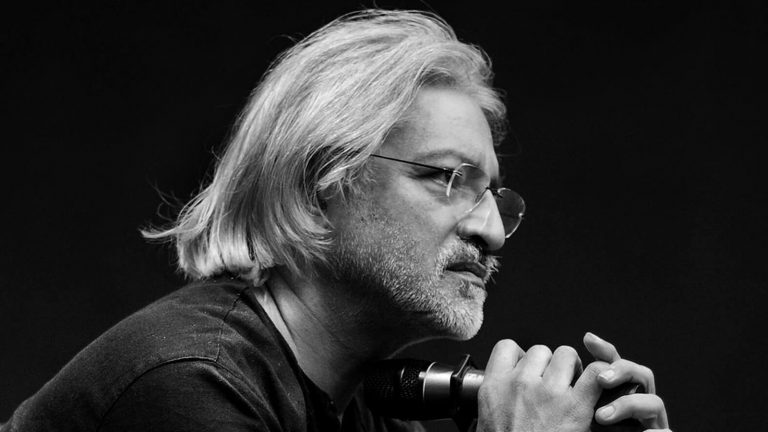Hot Docs Salutes Anand Patwardhan
By David Hudson |
THE DAILY
APR 28, 2022

Presenting more than 220 films from sixty-three countries both online (and for the first time since 2019) in Toronto theaters, Hot Docs, opening today and running through May 8, is honoring Indian filmmaker Anand Patwardhan with an Outstanding Achievement Award. For more than fifty years, Patwardhan has been making features and shorts that have won awards at festivals around the world and screened at such prestigious institutions as MoMA and Tate Modern—only to be censored in his home country.
“The India that Anand and I grew up in a constitutionally secular, inclusive republic with a vibrant free media, an independent judiciary and a working parliament—no longer exists,” writes filmmaker and programmer Ali Kazimi, introducing the retrospective of four features. “The New India, as it is referred to by the ruling Bharatiya Janata Party (BJP), is a land where lynchings, pogroms, and open calls for genocide occur, driven by the hate of minorities, specifically Muslims. Dissenting voices are silenced using a range of methods. With a few brave exceptions, Indian media have capitulated, amplifying and normalizing hate speech. In such a climate, Anand’s films take the viewer on a transformative, troubling, and often uncomfortable journey.”
Chronologically, the Hot Docs series begins in Canada with A Time to Rise(1981). Inspired by activist Cesar Chavez’s success in organizing farm laborers in California, Indo-Canadian farm workers in British Columbia teamed up with their white coworkers to face down violent attacks and death threats to organize on their own. A Time to Rise chronicles the events that led to the formation of the Canadian Farmworkers Union in 1980.
Father, Son and Holy War (1994) is a two-part study of the cult of masculinity that Patwardhan sees as the driving force behind the Hindu nationalist mob that overran and demolished a sixteenth-century mosque in 1992. Hundreds died, thousands were injured, and Muslims responded with a series of bombings that killed more than 250 people. When filmmaker Mark Cousins first saw Father, Son and Holy War, he found that it “had the best qualities of journalism, but was essayistic, too, and angry, informed, expansive, epic, and urgent.”
Taking the nuclear arms race between India and Pakistan as its starting point, War and Peace (2002) is a journey that eventually leads Patwardhan to the U.S., the only country that has ever dropped an atom bomb, and to Japan, where he meets survivors in Hiroshima and Nagasaki. In a 2003 issue of the Village Voice, J. Hoberman wrote that “Patwardhan’s film gives doomsday a human face. Immersed in popular culture, War and Peacemakes it clear that India’s nuclear mania appeals not only to religious chauvinism, primitive nationalism, and a desire for modernity but, even more dangerously, to a festering sense of inferiority. ‘Now no Indian has to show his passport,’ one official boasts.” Writing in 2010, Srikanth Srinivasan noted that War and Peace was “slammed by Pakistan for being anti-Pakistani and by India for being anti-Indian, while the film’s barrel was pointed elsewhere.”
When Reason won the top award at IDFA in 2018, Neil Young wrote in his review for the Hollywood Reporter that “this teemingly detailed four-hour epic exhaustively examines the rise of right-wing Hindu extremism through the bloody prism of politically inspired killings over the past half-decade.” Reason is a “stingingly topical indictment of crude, resurgent nationalism” with “obvious connections to events elsewhere across the globe.” Profiling Patwardhan for the New York Times Magazine in 2020, Abhrajyoti Chakraborty noted that Reason “contradicts the narrative that the BJP routinely projects to the country’s 900 million voters: a story where, under [Prime Minister Narendra] Modi, India is at last starting to fulfill its potential, more than seventy years after independence.”
Last fall, ArtReview’s Mark Rappolt asked Patwardhan for an assessment of the state of his country. “I think that we’re obviously at a very low downturn, probably the darkest period since independence,” said Patwardhan, “but it’s not going to stay that way, that is clear. You can already see things that are happening that are going to overturn the system as it is right now. I’m hoping that people will soon reach the end of their tolerance for rising fascism . . . I’m always optimistic. Not as a political choice, but because it’s a form of survival. If you’re not optimistic, then you commit suicide, either physically or mentally.”